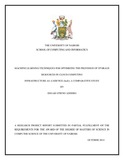| dc.description.abstract | Cloud computing is a very popular field at present which is growing very fast and the future of
the field seems really wide. With progressive spotlight on cloud computing as a possible solution
for a flexible, on-demand computing infrastructure for lots of applications, many companies and
unions have started using it. Obviously, cloud computing has been recognized as a model for
supporting infrastructure, platform and software services. Within cloud systems, massive
distributed data center infrastructure, virtualized physical resources, virtualized middleware
platform such as VMware as well as applications are all being provided and consumed as
services. The cloud clients should get good and reliable services from a provider and the provider
should allocate the resources in a proper way so as to render good services to a client. This
brings about the problem of optimization where clients request for more services than they
actually require leading to wastage of the cloud storage resource .This demands for optimization
both on the part of the client and the cloud service provider. This has lead to increased research
in the various techniques that can be used for resource allocation within cloud services. This
research focuses on the analysis of machine learning as a technique that can be used to predict
the cloud storage service request patterns from the clients. The research focuses on a review of
machine learning as a technique that can be used to predict and therefore optimize the user
storage resource demand and usage for the case of cloud computing storage IaaS. Data on cloud
storage resource usage was subjected to experiments using machine learning techniques so as to
determine which give the most accurate prediction. Some of these machine learning techniques
to be reviewed in this research include linear regression, artificial neural networks (ANN),
support vector machines (SVM).From the experiments done in this research, it can be concluded
that the use of support vector machine algorithm (SVM) proves to be the best algorithm for
learning the storage resource usage patterns and predicting their future usage so as to enable
better resource budgeting. | en_US |

